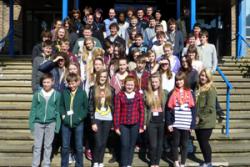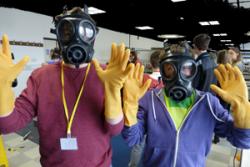Nuclear Course a Resounding Success
 Pupils from Rhyl High School, Conahs Quay High School, Ysgol John Bright and Ysgol Dyffryn Conwy.Fifty pupils from north Wales had to opportunity to learn how to solve some of the challenges facing the nuclear industry recently. Sponsored by Bangor University and RWE npower renewables, and led by educational charity, The Smallpeice Trust, the three-day residential course introduced students to a variety of topical subjects, including radiation, the environment, health and safety and decommissioning of plants.
Pupils from Rhyl High School, Conahs Quay High School, Ysgol John Bright and Ysgol Dyffryn Conwy.Fifty pupils from north Wales had to opportunity to learn how to solve some of the challenges facing the nuclear industry recently. Sponsored by Bangor University and RWE npower renewables, and led by educational charity, The Smallpeice Trust, the three-day residential course introduced students to a variety of topical subjects, including radiation, the environment, health and safety and decommissioning of plants.
Working in teams, the 13 and 14 year old pupils from Rhyl High School, Conahs Quay High School, Ysgol John Bright and Ysgol Dyffryn Conwy took part in a combination of presentations, workshops, practical ‘design-and-make’ projects, and a final assessment which involved wearing full protective clothing.
The design-and-make project, led by real engineers from the National Nuclear Laboratory, challenged students to move waste from one location to another. It involved the students pitching their idea in a “Dragon’s Den” type of scenario in order to gain funding, allowing them to then go out and make their design.
As well as working on the design, build and test elements of the projects, they developed life skills such as teamwork, communication, problem solving, time management, finance and presentation. The social programme included a quiz, sports activities and a formal dinner and disco.
 Stevie Scanlan, Marketing Manager from Bangor University’s College of Physical & Applied Sciences said: “We’re delighted to host an event which engages young people in some very real scientific scenarios. We hope that their participation will encourage them to continue their interest in science subjects, this year we were joined by some Engineers from the Magnox Graduate Training Programme who came to help out with the activities.”
Stevie Scanlan, Marketing Manager from Bangor University’s College of Physical & Applied Sciences said: “We’re delighted to host an event which engages young people in some very real scientific scenarios. We hope that their participation will encourage them to continue their interest in science subjects, this year we were joined by some Engineers from the Magnox Graduate Training Programme who came to help out with the activities.”
Gemma Murphy, Head of Marketing and Development for The Smallpeice Trust added: “Thanks to generous sponsorship from Bangor University, we are delighted to be able to offer students a unique insight into the nuclear industry for the third year running. Exciting developments within the nuclear sector have been a direct result of the increasing importance of reducing carbon emissions and ensuring secure energy supplies. Opportunities such as these seek to inspire students to tackle these ongoing concerns and take a lead in future developments.”
Publication date: 8 April 2013
